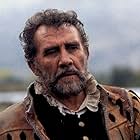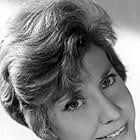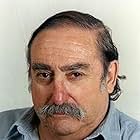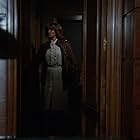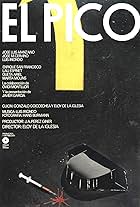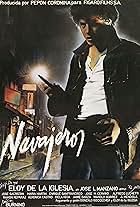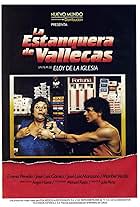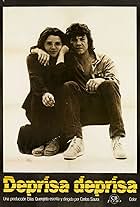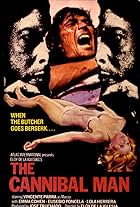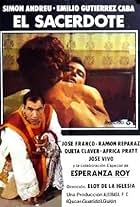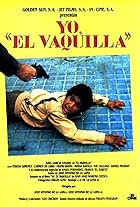Aggiungi una trama nella tua linguaPaco, and his Civil Guard father, relocate to Madrid, where an investigative reporter is determined to find the truth about Paco's involvement in the shooting of a drug dealer back in Bilbao... Leggi tuttoPaco, and his Civil Guard father, relocate to Madrid, where an investigative reporter is determined to find the truth about Paco's involvement in the shooting of a drug dealer back in Bilbao, which lands Paco in a lot of trouble.Paco, and his Civil Guard father, relocate to Madrid, where an investigative reporter is determined to find the truth about Paco's involvement in the shooting of a drug dealer back in Bilbao, which lands Paco in a lot of trouble.
- Premi
- 2 candidature
Foto
José Luis Manzano
- Paco
- (as Jose Luis Manzano)
Fernando Guillén
- Evaristo Torrecuadrada
- (as Fernando Guillen)
Andrea Albani
- Betty
- (as Lali Espinet)
Valentín Paredes
- El Tejas
- (as Valentin Paredes)
Fermín Cabal
- Miguel Caballero
- (as Fermin Cabal)
Tony Valento
- Fernando
- (as Tony Valente)
Ramón Repáraz
- Comisario
- (as Ramon Reparaz)
Alfred Lucchetti
- Coronel
- (as Alfred Luchetti)
Pedro Nieva Parola
- Teniente Alcántara
- (as Nieva Parola)
Fernando Marín
- Capitán
- (as Jose Guillermo Marin)
José María Escuer
- López
- (as Jose Maria Escuer)
Agustín González
- Laureano Alonso
- (as Agustin Gonzalez)
Trama
Lo sapevi?
- QuizFinal film of Andrea Albani.
- ConnessioniFeatured in Eloy De La Iglesia's Quinqui Collection (2021)
- Colonne sonorePaco
Music by Luis Iriondo
Recensione in evidenza
Inferior follow-up dealing equally with delinquency , terrorism , dirty war and other dramatic events about heroin addiction . Violent and thought-provoking look about youthful delinquency , generational problems , drugging in Spain from the 80s , adding continuous flashbacks taken from the first installment . Intelligent film about juvenile delinquency and upon prison life where the starring is harassed and humiliated until that fury and revenge emerge . It deals with the delinquent junkie named Paco who along with his stiff dad , the Guardia Civil commandant (Fernando Guillen) go to Madrid . There they live at a familiar ( with the queens of Spanish comedy as Rafaela Aparicio and Gracita Morales) home . But Paco is locked-up accused for killing a couple . It's an interesting film developed in two parts : in and out prison . The best part is narrated into prison because of it reflects the astonishing existence of the inmates , with fights , threats ,murders and where rules the strongest's law . Later on , he is freed and forced into street hustling and ever-expanding life of crime . Paco again hag out with Betty (Lali Espinet or Andrea Albani for the 'S' movies) , an Argentinian whore who deliver him heroin . Paco also hags out with a broken-out convict nicknamed Leendakari (Jaume Valls) . Both of them scheme and carry out robberies to earn money in and around Madrid . As the trio attacks an armored van but the events get worse .
¨El Pico 2¨ is one of several movies dealing with youth delinquency in Spain during the 70s and early 80s along with ¨Perros Callejeros I and II¨, ¨ Los Ultimos Golpes Del Torete¨, ¨Yo el Vaquilla¨, mostly realized by Jose Antonio De La Loma , ¨Navajeros , "Colegas", "El Pico " and especially ¨Deprisa , Deprisa¨ by Carlos Saura and later on , ¨La Estanquera De Vallecas ¨ , among others . Most films mixed exploitation , nudity , violence , with asocial commentary . Seen today, his films are unique documents on how life was lived and perceived during that period . These films were notorious in the years of the Spanish transition to democracy including provoking and polemic issues and played by unknown young people . His style is pretty much urban and realistic as well in the atmosphere as in the fresh dialog and attempted to take a position in favor of outcast people . Drugs , delinquency , and generational problems are the habitual subjects in these films and specially dedicated to the underworld of heroin and a very realistic look at drug addiction . We see their troubles growing in such streets , neighborhoods and some fine locations . These flicks show the ugliness of those "barrios" , toughness and cold existence of people , including great looks at young life and friendship in the margined side ,letting the stories flow efficiently and being realized in realistic style . Passing of time hasn't had mercy with most of those movies , but they represented a time and a way of life in the history of Spain ; and now they may seem a little bit naive . Eloy De La Iglesia with his ¨El pico I and II¨ we watch the day-by-day of delinquents committing violent crimes , however De La Iglesia got to make a both lyric and documentary-style flick . The director creates a sort of Spanish Neo-Realism by tackling the juvenile delinquency in the prison and streets from a sociological point of view . The screenplay by Gonzalo Goicoechea is such strong with disagreeable events , though also with some ingenuousness , but in 1980, a few years after General Franco died it wasn't naive at all . Eloy De La Iglesia chose young and natural actors who play their part to the hilt , unafraid of filmmaker's unsympathetic camera and the particularity of the characters . Atmospheric photography with juicy atmosphere by Javier Aguirresarrobe , deemed one of the best international cameramen . Many years later , Aguirresarrobe would become the best Spanish photographer and even working in Hollywood : ¨Twilight saga¨ , ¨The road¨ and ¨Fright night¨ .
The film regularly directed by Eloy De La Iglesia though with some flaws and gaps . De La Iglesia is a talented Spanish movies director , he began working in cinema in 1966, though he became notorious in the years of the Spanish transition to democracy with shocking and polemic films as ¨El Pico 1 and 2¨ , ¨El Diputado¨, ¨The priest , ¨Clockwork terror¨ , ¨La Otra Alcoba¨ , ¨El Techo De Cristal¨, ¨La Semana Del Asesino¨ , and after that , ¨Bulgarian lovers¨ and many others . Drugs , delinquency, terrorism and generational problems are the habitual subjects in his films , and specially dedicated to the underworld of heroin ; as well as the gay world . Seen today , his films are unique documents on how life was lived and perceived during that period . And unlike other filmmakers from the period , De La Iglesia is a pretty good filmmaker . The eye De La Iglesia had for social commentary as the attitudes of police and delinquents in realistic manner , sometimes mixed together quite badly with comedy . At his best , his films still had the gritty edge , the naturalistic approach and the poignancy that made them successful at the time . At his works , they show how thin is the line between contention and excess , between drama and exploitation . As Eloy De La Iglesia chose young and natural actors Jose Luis Manzano , Pirri, or Antonio Flores were the usual ones . All of them early deceased by drugging , including the filmmaker . Rating : acceptable and passable.
¨El Pico 2¨ is one of several movies dealing with youth delinquency in Spain during the 70s and early 80s along with ¨Perros Callejeros I and II¨, ¨ Los Ultimos Golpes Del Torete¨, ¨Yo el Vaquilla¨, mostly realized by Jose Antonio De La Loma , ¨Navajeros , "Colegas", "El Pico " and especially ¨Deprisa , Deprisa¨ by Carlos Saura and later on , ¨La Estanquera De Vallecas ¨ , among others . Most films mixed exploitation , nudity , violence , with asocial commentary . Seen today, his films are unique documents on how life was lived and perceived during that period . These films were notorious in the years of the Spanish transition to democracy including provoking and polemic issues and played by unknown young people . His style is pretty much urban and realistic as well in the atmosphere as in the fresh dialog and attempted to take a position in favor of outcast people . Drugs , delinquency , and generational problems are the habitual subjects in these films and specially dedicated to the underworld of heroin and a very realistic look at drug addiction . We see their troubles growing in such streets , neighborhoods and some fine locations . These flicks show the ugliness of those "barrios" , toughness and cold existence of people , including great looks at young life and friendship in the margined side ,letting the stories flow efficiently and being realized in realistic style . Passing of time hasn't had mercy with most of those movies , but they represented a time and a way of life in the history of Spain ; and now they may seem a little bit naive . Eloy De La Iglesia with his ¨El pico I and II¨ we watch the day-by-day of delinquents committing violent crimes , however De La Iglesia got to make a both lyric and documentary-style flick . The director creates a sort of Spanish Neo-Realism by tackling the juvenile delinquency in the prison and streets from a sociological point of view . The screenplay by Gonzalo Goicoechea is such strong with disagreeable events , though also with some ingenuousness , but in 1980, a few years after General Franco died it wasn't naive at all . Eloy De La Iglesia chose young and natural actors who play their part to the hilt , unafraid of filmmaker's unsympathetic camera and the particularity of the characters . Atmospheric photography with juicy atmosphere by Javier Aguirresarrobe , deemed one of the best international cameramen . Many years later , Aguirresarrobe would become the best Spanish photographer and even working in Hollywood : ¨Twilight saga¨ , ¨The road¨ and ¨Fright night¨ .
The film regularly directed by Eloy De La Iglesia though with some flaws and gaps . De La Iglesia is a talented Spanish movies director , he began working in cinema in 1966, though he became notorious in the years of the Spanish transition to democracy with shocking and polemic films as ¨El Pico 1 and 2¨ , ¨El Diputado¨, ¨The priest , ¨Clockwork terror¨ , ¨La Otra Alcoba¨ , ¨El Techo De Cristal¨, ¨La Semana Del Asesino¨ , and after that , ¨Bulgarian lovers¨ and many others . Drugs , delinquency, terrorism and generational problems are the habitual subjects in his films , and specially dedicated to the underworld of heroin ; as well as the gay world . Seen today , his films are unique documents on how life was lived and perceived during that period . And unlike other filmmakers from the period , De La Iglesia is a pretty good filmmaker . The eye De La Iglesia had for social commentary as the attitudes of police and delinquents in realistic manner , sometimes mixed together quite badly with comedy . At his best , his films still had the gritty edge , the naturalistic approach and the poignancy that made them successful at the time . At his works , they show how thin is the line between contention and excess , between drama and exploitation . As Eloy De La Iglesia chose young and natural actors Jose Luis Manzano , Pirri, or Antonio Flores were the usual ones . All of them early deceased by drugging , including the filmmaker . Rating : acceptable and passable.
I più visti
Accedi per valutare e creare un elenco di titoli salvati per ottenere consigli personalizzati
- How long is El pico 2?Powered by Alexa
Dettagli
- Data di uscita
- Paese di origine
- Sito ufficiale
- Lingua
- Celebre anche come
- L'enfer de la drogue 2
- Luoghi delle riprese
- Azienda produttrice
- Vedi altri crediti dell’azienda su IMDbPro
- Tempo di esecuzione2 ore
- Colore
- Proporzioni
- 1.66 : 1
Contribuisci a questa pagina
Suggerisci una modifica o aggiungi i contenuti mancanti

Divario superiore
By what name was El pico 2 (1984) officially released in Canada in English?
Rispondi


